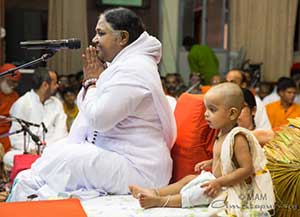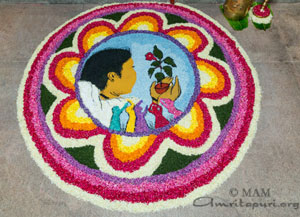14 September 2016 — Onam Celebrations at Amritapuri Ashram
(Amma’s message on the occasion of Onam festival)
Amma is extremely happy to see all of you have gathered here to celebrate Thiruvonam with Amma. It shows the bond you have with Amma. May this bond and love be always there between all of you as well. It is said that the relative of a devotee is another devotee alone. It is this message of unity and love that Thiruvonam brings to us.
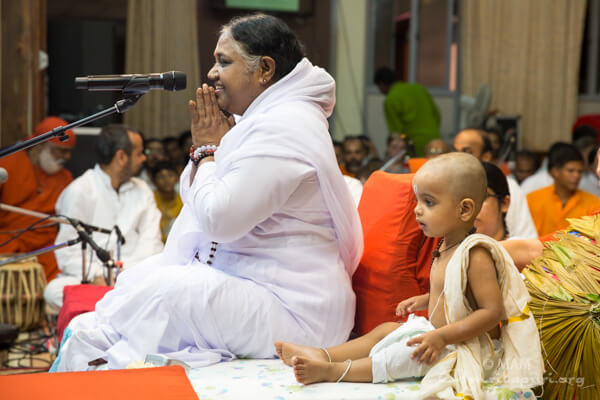
Onam presents a role model of the relationship between the government and the governed. Mahabali desired nothing but the welfare of his subjects. His people, too, loved their king. The festival of Onam presents the bond between them—their unity, love and equality—before our eyes. How should rulers be? How should citizens be? Onam presents a perfect ideal of this, which is essential in today’s world.
Onam is the celebration of human relationships. It is the time when relationships among family members, friends and relatives get strengthened. We live in an age where all human bonds have become weak. Husbands and wives are becoming estranged from one another. Mother-child relationships, father-child relationships, teacher-student relationships and relationships between neighbours are all becoming weaker. Onam comes to us bearing the message of reviving these relationships and strengthening them. Onam becomes Onam only when this is achieved.

However, Onam is not a celebration of human relationships alone. It is also a celebration of the bond between Nature and humankind. Beyond that, it is also a celebration of the bond between God and humanity. What sets Onam apart from other celebrations is its completeness. Onam is a festival that includes all aspects of life. Children, women, young people, and the elderly all have their respective roles in the festival. The celebration is relevant at the family level as well as at the societal level. Similarly, it also impacts our immediate surrounds, Nature as a whole, as well as our own bodies and minds. Onam is also the festival of cultural values and art forms.
Moreover, Onam is the story of the transformation that came over Emperor Mahabali. Although a righteous king, Bali took great pride in his own abilities and good qualities. When his guru, Sukracharya, warned him that Vamana—the dwarf boy who stood before him—was in reality Lord Vishnu, a battle ensued within him. Either adhere to truth and lose his all his name and position or try to safeguard his name and position by turning his back on truth. Mahabali chose the former path. It was the path of renunciation.
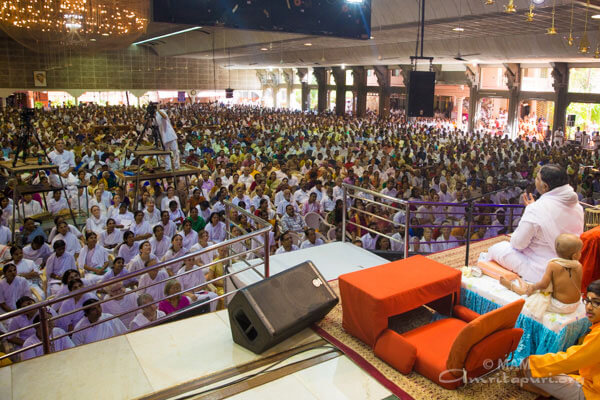
In the end, when the dwarf Vamana grew in size and measured the earth and the heavens in two strides, Mahabali’s pride crumbled to pieces. In order to keep his word and uphold the truth, he surrendered his own self. However, that defeat became his success. It is Nature’s infallible law that he who renounces everything achieves everything. Mahabali became like gold that has been purified by fire. He rose to becoming purnam—whole—and attained immortal fame.
The battle that arose in Mahabali’s heart takes place within every human being as the battle between good and evil, the battle between positive and negative emotions, the battle between selfishness and selflessness. Those who choose the path of righteousness are fortunate. Mahabali’s story is a message to the modern man who prides himself on his own abilities, yet staggers without answers when faced with life’s challenges.
Mahabali was an asura—a member of a race of demons. Prahlada was also an asura. Vibhishana was a rakshasa—a different type of demon. Regardless all three became perfect beings. This proves that goodness exists within all of us, and if we try, we can awaken it.
Today we judge people as great or otherwise based on the wealth they possess or their fame or position in society. Once these are lost, their “greatness” is also lost. This is the law of the world. But this is not true in spirituality. One becomes great only when one loses their identity with “I” and “mine” and the resulting attachments. This is when man becomes God. When Mahabali surrendered everything to the omnipresent Vishnu Consciousness, he transcended the boundaries of “I” and “mine” and attained the Supreme. This is the principle behind the story.
Discernment is the “switch” that turns on the light of knowledge.
Mahabali’s reign marked a golden era where people didn’t tell lies and there was no deceit or slander. However, today, the situation is the complete opposite. The age we live in seems to have only one slogan, “My own happiness! My own gain!” This attitude will only lead us to darkness and sorrow. There is a belief that King Mahabali visits his subjects on Thiruvonam and enquires about their welfare. The real principle behind this belief is that we should awaken from our stupor of selfishness and view the world around us through the eyes of Mahabali. It is the little acts of love and respect that we show towards our fellow beings that fill our lives with joy. When each one of us thinks what we can do to make others happy, then naturally our hearts will fill with joy. This was all Mahabali really wished for. He just wanted to his subjects experience peace, prosperity, happiness and contentment. He never wished anything for himself. Mahabali’s vision for his subjects was like a mahatma’s vision for the world as a whole. It was a vision devoid of selfishness.
There is a lesson to be learned from each and every experience in life. But we need sraddha and viveka—attentiveness and discernment—to be able to recognise the lessons life is trying to teach us. Discernment is the “switch” that turns on the light of knowledge. Those with discernment are able to understand the message behind each positive and negative experience in life and accept everything that comes their way with a smile.
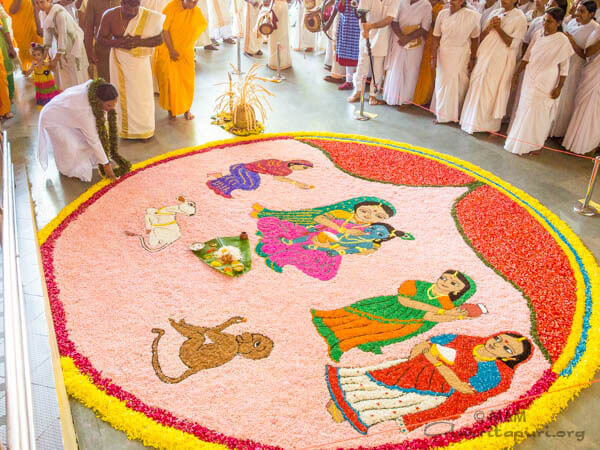
For Onam we have the tradition of wearing new clothes. Along with that, let us adopt the tradition of making new decisions that are for social good. Children, you enjoy traditional Onam songs and games for Onam. Make this joy permanent by learning to live a life founded on spiritual principles. For Onam, we compete to make the largest and most beautiful pookkalams. At the same time, let us also make a floral design in our heart using flowers of love, flowers of patience, flowers of self-sacrifice and flowers of humility. Let us try to make our circle of compassion larger and more expansive. If we do this, we can make life itself a huge Onam celebration.
-Excerpts from Amma’s Thiruvonam Message

